|
|
|
Sort Order |
|
|
|
Items / Page
|
|
|
|
|
|
|
| Srl | Item |
| 1 |
ID:
112768


|
|
|
|
|
| Publication |
2012.
|
| Summary/Abstract |
This article provides a theoretically informed analysis to understand why and how security sector reform (SSR) norms have been integrated into the European Union (EU) security architecture. It investigates the role of epistemic communities in advancing the security-development/good governance agenda underpinning SSR and in fostering institutional learning. Shared knowledge and expertise have driven policy and institutional change, since they yielded a new policy consensus that transformed the EU's approach to security in the post-cold war international system. Empirical findings, based on content analysis and on 25+ semi-structured interviews, suggest that transnational expertise-based networks did play a leading role in shaping SSR conceptual development. However, they also show that cleavages between epistemic communities across the security/development dividing line are ultimately responsible for the EU's failure to achieve a coherent SSR policy implementation. Moreover, the article concludes that the institutionalisation of SSR in the EU did not originate in a single norm setter, nor in sheer ideational stimulus. Change occurred through the complex interplay between ideas and interests, that is between knowledge and power, leading specific norms to be visualised as consensual and dominant.
|
|
|
|
|
|
|
|
|
|
|
|
|
|
|
|
| 2 |
ID:
153144
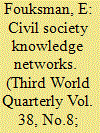

|
|
|
|
|
| Summary/Abstract |
What role have the processes and institutions of international development played in creating and propagating ideas around the world? This paper demonstrates that networks of development-focused civil society institutions can form global epistemic bridges even where communication technology, global markets, infrastructure, or state services do not reach. Given the penetration of these ‘civil society knowledge networks’ throughout the world, it is crucial to understand how these networks form, and how they create and spread ideas, mediating between global discourses and local needs. This paper builds on a multi-sited case study of one such civil society knowledge network, which includes an international foundation, its partner non-governmental organisations (NGOs) in Kenya, and one village where these NGOs run a forest conservation project. The case study provides a closely textured analysis of the mechanisms of knowledge production and consumption in the network, including personality politics, language, technology, political connections and the power dynamics of knowledge flows. It demonstrates the ways remoteness and disconnection are overcome through the epistemic reach of institutional networks involved in development interventions.
|
|
|
|
|
|
|
|
|
|
|
|
|
|
|
|
| 3 |
ID:
067373
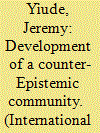

|
|
|
| 4 |
ID:
144728


|
|
|
|
|
| Summary/Abstract |
The paper’s main argument is that Israel’s security policy, which traditionally focused on defending its territorial integrity against regular Arab armed forces, was, by the 2010s, transformed into one that focuses on facing a variety of state- and non-state-based threats. Neo-realist explanations could neither account for the contested nature of the security debate during this period, nor the inconsistent evolution of the policy. The present study aims to solve this conundrum by introducing an alternative approach known as 4th generation strategic culture research. The paper is comprised of four parts. First, the origins and evolution of strategic culture are reviewed, with emphasis placed on the commonly accepted weaknesses that, to date, have prevented it from being used as a testable theoretical concept, and subsequently as an explanatory factor for security policy changes. The second part presents the “modernist constructivism” approach that bridges the gap between traditional constructivism and hypothesis-driven research design. Next, the paper introduces the emerging fourth generation in strategic culture literature, followed by a conceptual framework designed to resolve the inherent weaknesses of the more traditional approaches. Finally, this conceptual framework is applied to analyse the transformation of Israel’s security policy between 1982 and 2014.
|
|
|
|
|
|
|
|
|
|
|
|
|
|
|
|
| 5 |
ID:
165129
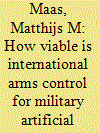

|
|
|
|
|
| Summary/Abstract |
Many observers anticipate “arms races” between states seeking to deploy artificial intelligence (AI) in diverse military applications, some of which raise concerns on ethical and legal grounds, or from the perspective of strategic stability or accident risk. How viable are arms control regimes for military AI? This article draws a parallel with the experience in controlling nuclear weapons, to examine the opportunities and pitfalls of efforts to prevent, channel, or contain the militarization of AI. It applies three analytical lenses to argue that (1) norm institutionalization can counter or slow proliferation; (2) organized “epistemic communities” of experts can effectively catalyze arms control; (3) many military AI applications will remain susceptible to “normal accidents,” such that assurances of “meaningful human control” are largely inadequate. I conclude that while there are key differences, understanding these lessons remains essential to those seeking to pursue or study the next chapter in global arms control.
|
|
|
|
|
|
|
|
|
|
|
|
|
|
|
|
| 6 |
ID:
096085
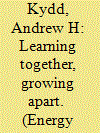

|
|
|
|
|
| Publication |
2010.
|
| Summary/Abstract |
Standard models of uncertainty in economics imply that sharing information can reduce uncertainty and help identify welfare improving policies. In international relations, "epistemic communities" of scientists are thought to help provide information for these purposes. However, conflicting preferences can frustrate the transmission of information and prevent effective information sharing. In addition, opportunities for information sharing can deepen distrust as actors observe each other's reaction to what to them is credible information. A model that assumes uncertainty both about the state of the world and the parties' motivations is applied to international climate change negotiations.
|
|
|
|
|
|
|
|
|
|
|
|
|
|
|
|
| 7 |
ID:
124619


|
|
|
|
|
| Publication |
2013.
|
| Summary/Abstract |
This article advances the argument that security integration is occurring in the European Union (EU) as a result of the influence of certain knowledge-based networks or epistemic communities. Given that EU member-states consistently resist integration in areas that are central to traditional state sovereignty, security integration presents a puzzle. The case of the EU Military Committee (EUMC) will serve as an example of how and why epistemic communities matter in security decision-making. Although the EUMC and the Common Security and Defence Policy are relatively new, the power of shared expertise among high-level military officers has already begun to dismantle sovereign barriers to security integration. In considering the puzzle of security integration, this article suggests that the epistemic community framework provides a better explanation for the emergence of a European security space than alternative arguments, such as principal-agent theory, intergovernmental bargaining, and regime theory. The case of a military epistemic community also serves to broaden the epistemic community literature, which tends to focus somewhat narrowly on cases of environmental and economics experts.
|
|
|
|
|
|
|
|
|
|
|
|
|
|
|
|
| 8 |
ID:
079899
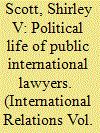

|
|
|
|
|
| Publication |
2007.
|
| Summary/Abstract |
The intervention of international lawyers in public debate in the US, UK and Australia regarding the 2003 invasion of Iraq spotlighted the political agency of international lawyers in according or withholding legitimacy from major foreign policy decisions and raised the question of how to delimit the scope of international lawyers' political agency. Rejecting the close fit of either the transnational advocacy network or epistemic community concepts to the role played by the collectivity of international lawyers, this article identifies factors that both permit international lawyers to function as the grantors or withholders of foreign policy legitimacy and serve to define the limits on their fulfilling that role
|
|
|
|
|
|
|
|
|
|
|
|
|
|
|
|
| 9 |
ID:
105634


|
|
|
|
|
| Publication |
2011.
|
| Summary/Abstract |
With the increasing influence of theocrats and other religious actors on policymakers and masses, recognising the agency of the clergy is crucial. This article uses the 'epistemic communities' framework to place the religious 'agents' in contemporary politics and it shows how hermeneutics can be treated as a form of 'episteme'. Until recently, this framework has been used to explain how scientific communities affect policymaking. Using the cases of South Africa and Northern Ireland, this article claims that religious actors, especially with their shared set of normative and principled beliefs as well as shared norms of validity, also meet the requirements of the epistemic community category. The employment of this established IR framework in theorising religious politics has the potential to shed light not only on peacebuilding and mediation, but also violent movements and terrorist organisations that use religion as justification.
|
|
|
|
|
|
|
|
|
|
|
|
|
|
|
|
| 10 |
ID:
161325
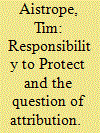

|
|
|
|
|
| Summary/Abstract |
This article explores the problem of attribution in the context of Responsibility to Protect (R2P) intervention through an analysis of the Syrian chemical weapons attack of 2013. We argue that R2P advocates can be confronted by a crisis dynamic where the political momentum for military intervention runs ahead of independent verification and attribution of mass atrocity crimes. We contrast the political momentum for intervention with the technical process of independent attribution and show that the sort of independent evidence that would ideally legitimize an R2P intervention was unavailable when there was political momentum for action. Conversely, the information that was available (which inevitably informed the political momentum for action) was largely produced by state intelligence organizations – or a potentially briefed media – and shaped by the interests and priorities of its end users. While understandable in the face of the ‘extreme’, we suggest that the mobilization of political momentum by R2P advocates entails significant dangers: first, it risks undermining the integrity of R2P if evidence is later discredited and second, it risks amplifying the perception that states sometimes exploit humanitarian pretexts in pursuit of other strategic ends.
|
|
|
|
|
|
|
|
|
|
|
|
|
|
|
|
| 11 |
ID:
118957


|
|
|
|
|
| Publication |
2013.
|
| Summary/Abstract |
The concept of epistemic communities - professional networks with authoritative and policy-relevant expertise - is well-known thanks to a 1992 special issue of International Organization. Over the past twenty years, the idea has gained some traction in International Relations scholarship, but has not evolved much beyond its original conceptualisation. Much of the research on epistemic communities has been limited to single case studies in articles, rather than broader comparative works, and has focused narrowly on groups of scientists. As a result, it is often assumed, erroneously, that epistemic communities are only comprised of scientists, and that the utility of the concept for understanding International Relations is quite narrow. Consequently, an otherwise promising approach to transnational networks has become somewhat marginalised over the years. This article revisits the concept of epistemic communities twenty years later and proposes specific innovations to the framework. In an increasingly globalising world, transnational actors are becoming progressively more numerous and influential. Epistemic communities are certainly at the forefront of these trends, and a better understanding of how they form and operate can give us a clear demonstration of how knowledge translates into power.
|
|
|
|
|
|
|
|
|
|
|
|
|
|
|
|
| 12 |
ID:
153259
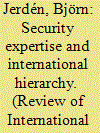

|
|
|
|
|
| Summary/Abstract |
Many states partially relinquish sovereignty in return for physical protection from a more powerful state. Mainstream theory on international hierarchies holds that such decisions are based on rational assessments of the relative qualities of the political order being offered. Such assessments, however, are bound to be contingent, and as such a reflection of the power to shape understandings of reality. Through a study of the remarkably persistent US-led security hierarchy in East Asia, this article puts forward the concept of the ‘epistemic community’ as a general explanation of how such understandings are shaped and, hence, why states accept subordinate positions in international hierarchies. The article conceptualises a transnational and multidisciplinary network of experts on international security – ‘The Asia-Pacific Epistemic Community’ – and demonstrates how it operates to convince East Asian policymakers that the current US-led social order is the best choice for maintaining regional ‘stability’.
|
|
|
|
|
|
|
|
|
|
|
|
|
|
|
|
| 13 |
ID:
174567
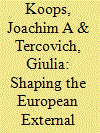

|
|
|
|
|
| Summary/Abstract |
This article assesses the role, influence and core aspects of the EU High Representatives’ (HR/VPs) “political leadership” in the context of their efforts to advance the institutionalisation of the EEAS and its crisis management structures in the post-Lisbon era. By combining analytical lenses from the literature on “European political leadership”, foreign policy analysis (FPA) and political psychology with insights from a wide range of semi-structured interviews and primary sources, the article analyses how the leadership approaches of Catherine Ashton and Federica Mogherini were influenced by core aspects, such as institutional setting, situational factors and “personal qualities”. By examining how both HR/VPs and their chosen advisors sought to shape the EU’s EEAS and crisis management institutions, scholars can gain important insights about how “personal qualities” and prior foreign policy experience can influence the HR/VPs strategic choices and their impact within and across the EEAS. Finally, the article considers the differing effects between “maverick” and “orthodox” leadership and approaches and concludes that whilst outside perspectives can bring fresh ideas and institutional innovations, they will fail to be of lasting significance and permanence if not accompanied by sufficient support from the dominant foreign and security policy conventions.
|
|
|
|
|
|
|
|
|
|
|
|
|
|
|
|
|
|
|
|
|